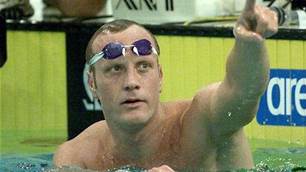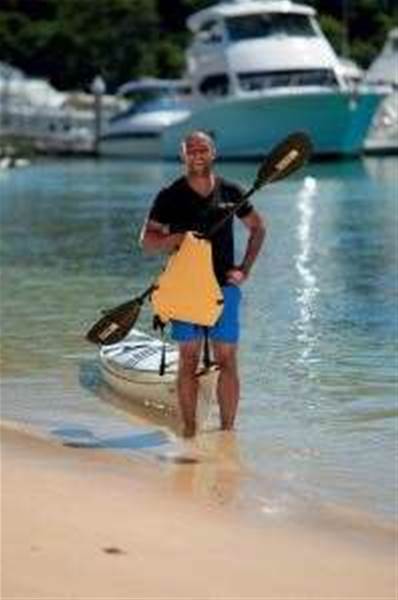We sat the Wallabies legend down for a yarn for this month's mag.
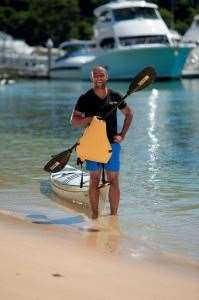 Image courtesy HealthyMetv
Image courtesy HealthyMetvIf George Gregan’s debut in the Wallabies jersey – a dour 23-20 victory over Italy at a half-empty Ballymore – was a somewhat forgettable affair, then the young halfback truly announced himself two months later in the sole Bledisloe Cup match at the SFS in 1994. With the second half winding down and the Wallabies clinging to a one-point lead, the All Blacks ran the ball through the hands before Jeff Wilson on the right wing stepped through three tackles, opening a clean passage to the tryline. He launched for the stripe, only for the young Australian halfback to drop from the clouds. George drove into Wilson’s ribs, the ball jolted loose, the Wallabies won by four, and Gregan’s place in Australian rugby folklore was forever sealed. Over the following 13 years, Gregan would collect a record 139 caps for the Wallabies and 136 for the Brumbies. He would hoist the Bledisloe Cup six times, the Tri-Nations Trophy twice, the Super Rugby Trophy twice, and the World Cup once. Beyond the stats, however, Gregan traversed airy peaks and dark valleys in his rugby journey. From the heady days of the Wallabies’ triumph at the 1999 World Cup to their ignominious quarter-final exit from the 2007 Cup, Gregan experienced the gamut. And so, with Australian rugby again in flux – the Brumbies looking to go one better in the Super 15 and the Wallabies aiming to build on an impressive Spring Tour – we sat the great man down for a yarn.
We see your GG Espresso cafes opening up all over Sydney. That must be keeping you very busy at the moment?
Well, my wife’s the driver of GG Espresso – we’ve been in that game since 1998. Recently, we’ve started branching into wine bars as well, so that’s all very interesting and exciting. I finished playing in 2011, in Japan, and since then I’ve found a few other things to get into, particularly HealthyMEtv. It’s basically internet-based media that shows people how they can lead healthier lives. Everyone in today’s world is very busy but also tech-savvy, so you can access this online – through your computer, your mobile phone, your tablet – and you get little soundbites of information, around three-to-five minutes max. They’re not too demanding on your time but they’re really good educational tools. I’ve done everything from bikram yoga, to pilates, to TRX, to commando training, and these bites explain the benefits of each form of training, how you do it, the price point. We also look at diet and mental health issues, being happy and healthy, body and mind. It’s all about showing how exercise can be a bit of fun but also very beneficial …
Perhaps your Brumbies brethren have been watching some of these segments – they certainly showed some amazing endurance in last year’s Super 15. As a foundation member of the franchise you must have enjoyed watching their push to the final?
Yeah, I was really impressed by the team and where they got to. I was so disappointed they missed out in the final – with 20 minutes to go they were in the lead and had a fantastic opportunity to cap off their season. But beating the Bulls in the semi in Pretoria was a monumental victory – something that hasn’t been done in many, many years. And their attitude after winning that match was fantastic. They said, “Right, we’ve got ourselves into the final, now we want to win the thing.” They travelled all the way back to New Zealand and came very, very close to beating the Chiefs on their turf. That’s the kind of performance that can spark a team on to bigger and better things …
Surely coach Jake White will be a big loss for them?
Yeah, he’s a big loss. But I think that was something the Brumbies were prepared for. Sure, he’d signed on for four years, but if he’d been appointed Wallabies coach the Brumbies would’ve had to undergo this change anyway, so they prepared for that eventuality by grooming Stephen Larkham for the head coaching role. That’s something that’s been in play for a while now. It may have come a year or two earlier than expected, but I don’t think that will hurt them too much. Stephen and Laurie Fisher work really well together, so I think this transition has been as seamless as possible. Yes, Jake White’s an internationally acclaimed coach who knows how to win, but the fundamentals he created will remain part of this group and hopefully be added to by Stephen and Laurie.
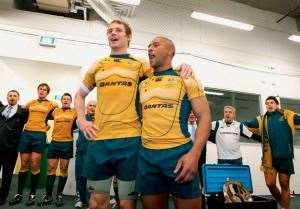 George Gregan still sings the praises of his 2007 Wallabies team-mate, now Brumbies' head coach Stephen Larkham. Photo: Getty Images
George Gregan still sings the praises of his 2007 Wallabies team-mate, now Brumbies' head coach Stephen Larkham. Photo: Getty ImagesBernie’s a very softly spoken bloke – has he got the requisite forcefulness to coach a Super rugby outfit?
Well, I think someone’s true persona and the persona they project from behind the glare of the cameras or the microphone are often two very different things. Stephen’s not a yeller and a screamer – never has been – and if he starts trying to do that now, people will look at him strangely. But he’s one of the most fiercely competitive people I’ve ever met in my life. He wants to win everything. And, believe me, that comes through in his coaching. I’ve been lucky enough to be close to him over the past few years at the Brumbies, working with the halves there, and I’ve seen firsthand just how strong his messaging is and how much respect he has amongst the players. For a head coach that’s very important. His personality can be very strong when it needs to be.
Judging from the way he played the game, his rugby intellect must be astonishing …
Look, he played at another level, so of course his technical under-standing’s right up there. But often, the greatest players struggle to become good coaches because some of the stuff they did on the field – stuff that looks instinctive – is hard to pass on to others. Stephen’s definitely not like that. His messaging is very clear and concise. The players understand him; they learn and grow. Look at Christian Lealiifano, Matt Toomua, Nic White, Henry Speight, Jesse Mogg – Stephen’s very good at getting his message across to these blokes and making them better players.
Who’ll challenge the Brumbies for the top spot of that Australian Super pool?
Well, the Reds stand out. They’ve got a consistent group of players who know how to play together. Obviously they have very good halves in Will Genia and Quade Cooper, but they also have a very hard-working pack. They’ll be in the mix, as always. New South Wales will be looking to add to what they started last year. I reckon that was a great first year for Michael Cheika and his players – they’ll be looking to play in the finals this year. But for me, the danger team are the Rebels. Scott Higginbotham played some outstanding rugby last year and they’ve recruited strong players around him. They’ve built a very good group of players.
Can you see the Chiefs enacting a Crusaders-like spell of dominance over the competition?
Well, yeah, they’re a very well-coached team. There hasn’t been a three-peat for over a decade, so that’ll be an obvious goal for them ... The Chiefs remind me a bit of the Reds: they’ve got a consistent group of players and they understand how they want to play. They’re a dangerous team who can hang on to the ball for long periods of time and break you down. I know he doesn’t like getting pointed out, but Wayne Smith is an incredible mentor. It’s not surprising that as soon as he went down there they started winning.
What was your take on Ben Mowen’s decision to quit Australian rugby at the end of this year and move to France with his family?
I understood his thought process. It’s obviously a decision he wouldn’t have taken lightly – giving up being part of a strong Wallabies team at the 2015 World Cup is the variable he was forced to consider. But I think people lose track of how much travel, how much time away is involved with professional rugby. Ben’s a Sydney boy who’s relocated his young family to Canberra. With his Wallabies commitments – a Lions tour, a Rugby Championship, a Spring Tour – he probably wouldn’t have had time at home until December. For your first breakthrough year – particularly as a 28-year-old – that’s a massive 12 months. When you take that into account, then factor in what lies ahead, he would’ve had two more years of a similar schedule. So I definitely understand his decision on a personal level.
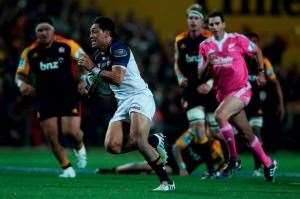 Brumbies like Christian Lealiifano have heard Larkham's message loud and clear. Photo: Getty Images.
Brumbies like Christian Lealiifano have heard Larkham's message loud and clear. Photo: Getty Images.Still, must’ve been a kick in the guts for Ewen McKenzie. How do you mark his first stanza as coach?
Well, he took over the team mid-season, then faced the best team in the world in his first two Tests. He took some risks early, in terms of how he had the team using the ball, and you could see they clearly weren’t all on the same page. But that takes time to develop. It’s tough to try to implement change in the Rugby Championship when you’re facing the two best teams in the world. But I think we saw the fruits of those changes in the end-of-year tour, and I’m convinced this team will only get better. As I said before, speaking about the Chiefs, a rugby team needs to have a complete understanding of how they need to play, and I think this team’s heading in that direction. True, their results weren’t fantastic last season, but look a little further and I think they’re tracking in the right direction. Look at how the back three – led by Israel Folau – were starting to impact on games. Teams are going to have to start really thinking about how they kick the ball to this Australian team because this back three are developing an understanding of when they need to use the ball and when they need to play field position. And with a strong back three comes a real confidence through the whole playing group.
The All Blacks seem to have an unending conveyor belt of talent right now. With the 2015 World Cup looming, can you see us knocking them off their pedestal?
Yeah, definitely. I mean, a strong conveyor belt of talent is nothing new for New Zealand! Sure, this is a special All Blacks team, but I’ve never seen a bad New Zealand team. This team has won a lot of games narrowly over the past few years – they’ve just got that knack. But every team’s beatable. You’ve got to create doubt, you’ve got to alter their mindset, and the only way you can do that is by beating them consistently. Beat a team and they suddenly don’t look so daunting. Look at the Ashes – momentum changes. Teams that looked fantastic can suddenly look very average. Sport’s like that – you just need breakthrough victories. And it’s not just one victory – you need plural wins. That’s how this Australian team’s got to think. And, to be honest, that’s what New Zealand expects of us.
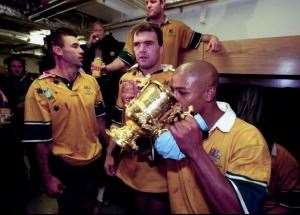 That '99 World Cup win tasted sweet. Photo: Getty Images.
That '99 World Cup win tasted sweet. Photo: Getty Images.And the prospect of Quade Cooper as Wallabies captain – what are your thoughts there?
Look, I’m not going to comment on who might be captain, but I will say this: I think it’s good there’s now a group of players who are becoming men; a group who are standing up and becoming leaders. You need strong leadership across the whole squad. Ideally you want four or five guys who could become captain. I think that’s the direction this team’s taking and I reckon Quade’s a good example of this process in action.
What does Australian rugby need to do to get back to the glory days of the 1990s and early 2000s?
Well, those teams had their dark days as well ... Sure, we had a fantastic run, but we also faced some tough times before that. We learnt from those dark days and we started to develop some consistency of performance against the top teams. From there, winning becomes a habit – you develop that shared experience within the group. And I don’t think that’s too far away for this team. I think they can make that step. More importantly, earlier we talked about New Zealand’s endless conveyor belt of talent. Well, they’ve got that because of the pathways they’ve developed. If they’re not playing Test rugby they’re playing Super Rugby; if they’re not playing Super Rugby they’re playing ITM Rugby against some of the best players in the world. We’ve lacked that for a couple of years, so it’s great to see we’re looking to develop that this year with the new National Rugby Championship. This competition is really, really important in allowing Australia to compete with the best rugby nations. It’s critical in developing our athletes. You know, the AFL and NRL are ruthless in their pursuit of the best athletes, so when you’ve got some good athletes playing your sport, you’ve got to create a pathway that keeps them interested and develops them as players. That’s a story you’ve got to be able to tell ...
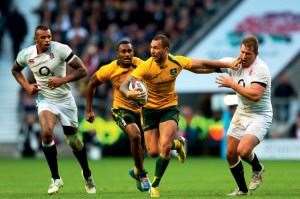 Wallabies captaincy or not, Quade Cooper is becoming a "leader". Photo: Getty Images
Wallabies captaincy or not, Quade Cooper is becoming a "leader". Photo: Getty ImagesThis new National Rugby Championship is mooted to run throughout August and September. With the Super 15 starting in February, that’s a monumentally long season.
Yeah, well that’s something they’ve got to monitor. If players have played all the Super matches and all the Test matches, there might be limited opportunities to play in the Championship. You don’t want to be burning your players out – that’s a self-defeating cycle.
Do you ever fear for the future of Australian rugby in the face of the AFL and NRL? Will it revert back to being the boutique sport it was before the 1991 World Cup?
Look, it’s a challenging time. Compared to those leagues we’re quite young as a professional sport. We went professional in 1996 and from 1998 onwards we had an incredible period of success, growth and participation. And events at the time helped that: it helped having the Lions tour in 2001, it helped hosting the 2003 World Cup. But when you have those fantastic years, you have to use them to your best advantage to develop your sport. And, yes, you could argue there were times when rugby didn’t do that. But we’re quick learners. Again, look at this new National Rugby Championship – it’s a step in the right direction. The other codes are very good at providing pathways for players and showing fans the next generation of players coming through. People like going on that journey with teams, they like discovering new talent at a young age. It gets people inspired and emotionally attached to a team. That’s really important and I think that’s something this new championship will provide. And that’s only talking 15 a-side. I also think the Sevens competition at the 2016 Olympics is going to be really important. The Olympics are obviously huge – I reckon they’ll be a catalyst for some great growth in the game over the next few years. So I see some really positive signs for rugby in this country.
Related Articles
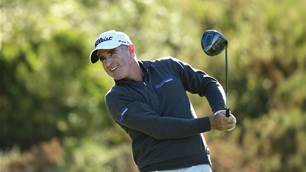
Video interview: Drinks With ... Matt Millar
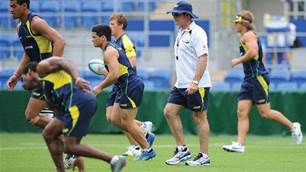
Michael O'Connor still an asset to Aussie 7s squads
